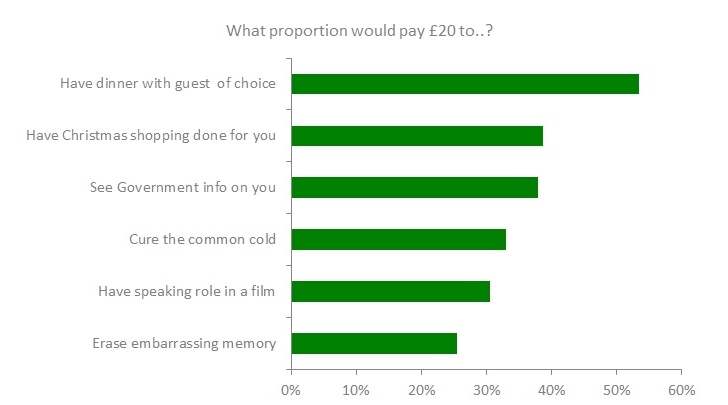The Worth: Access to Government Information About You
Posted: 08/07/2016

“In a time of low Government trust, should we be concerned about Big Brother’s surveillance?”

As you scroll through websites or fill in online forms, do you give any thought to who can access these patterns of behaviour or the information that you provide? We measured the public’s concern on this issue, with particular focus on the information available to the Government. Specifically, how much would the British public pay to be able to see all the information that the Government has about them?
As the country grapples with the consequences of the Brexit referendum, the result is being seen by some as a protest vote against Westminster. Distrust of politicians is a persistent feature of our annual Brand Personality report. For example, the Tories are seen as the 5th most dishonest brand in the UK and other political parties fare little better. This view is corroborated by Edelman’s annual “Trust Barometer” (see here), which this year found that just 36% of people trust the Government.
This distrust has many causes including, perhaps, recent revelations by whistle-blower Edward Snowden. Increasing public scepticism around digital privacy, information ownership and Government ethics fulfils Orwell’s vision of an ‘Inner Party’, an elite group aided by omnipresent surveillance1. Without access to the information Big Brother has on us, for example, we can be manipulated through targeted messaging, incomplete information could portray an unrealistic assessment of us, and we can never correct details that are unjust or inaccurate.
So it is surprising that, when asked their willingness to pay a stated amount, only 38% of respondents would pay £20 to see that information (for further details on our methodology please see Technical Notes). For context, slightly more people would pay that to have their Christmas shopping done by someone else. Women and older people won’t even pay that much. Perhaps they don’t care. Maybe they have less to hide, supported by the previous finding that older respondents would also pay less to erase an embarrassing memory. Conversely, Scottish residents are significantly more willing to pay to access their UK surveillance data, consistent with the latest Scottish Social Attitudes Survey showing a higher level of trust by Scots for the Scottish (73%) compared to the UK (23%) Government.
When asked which agency or company had the most information about them, by far the most commonly cited institution was HMRC. People also mentioned the NHS, Police, Department for Work and Pensions and Ministry of Defence. It would seem that the content of our P60s is what we assume is most scrutinised, which would surely be the dullest ever episode of Big Brother.
1 Orwell G. (1949). Nineteen Eighty-Four. London: Secker & Warburg. In this dystopian novel Orwell managed to coin the terms Cold War, Big Brother, Thought Police and Room 101.